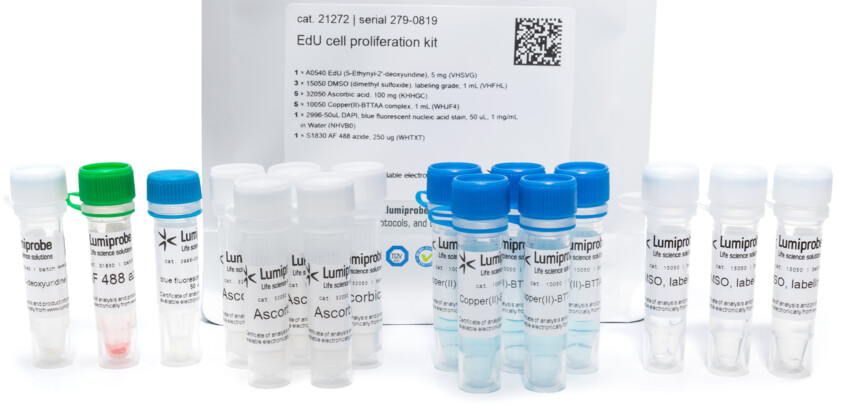EdU Cell Proliferation Kit
Methods for quantifying cell proliferation are widely used in cytotoxicity studies, oncology research, and other areas of cell biology. Many of them allow the visualization of proliferating cells using fluorescent dyes and can be used for high-throughput screening.
Detection of DNA replicated during the S-phase of the cell cycle is one of the most direct ways to detect cell proliferation. Typically, 5-bromo-2’-deoxyuridine (BrdU), a synthetic analog of thymidine that is incorporated into the daughter strands of DNA during DNA replication, is used for this purpose. BrdU-containing DNA is then detected immunochemically using antibodies specific to this nucleoside.
A quick and simple alternative to immunochemistry is to label dividing cells with another nucleoside, 5-ethynyl-2’-deoxyuridine (EdU). Like BrdU, it can be delivered into cells by adding it to culture media or injecting it into animals. EdU is also a substrate of cellular kinases and DNA polymerases, due to which it is incorporated into DNA during its replication. After this, the DNA of the daughter cells containing the ethynyl fragments can be labeled using a click reaction with fluorescent azides in the presence of a copper catalyst.

Cells labeled in this way can be detected by microscopy and cytometry or used to sort daughter cells and cells that have not undergone division.
Lumiprobe offers a ready-to-use EdU Cell Proliferation Kit in five variants with different fluorescent dyes.

Each kit contains:
- 5-Ethynyl-2’-deoxyuridine (EdU), an analog of thymidine;
- Cu(II)-BTTAA complex, a catalyst for click reaction;
- Ascorbic acid, a reducing agent for copper;
- An azide of one of the fluorescent dyes — AF 488 (Cat. 21272), AF 555 (Cat. 22272), AF 594 (Cat. 23272), or AF 647 (Cat. 24272), or a set of four azides — the All-Colors kit (Cat. .2S272);
- DMSO, dimethyl sulfoxide labeling grade, a solvent for azides;
- DAPI, blue fluorescent nuclear dye.
Customers also purchased with this product
CFDA SE Cell Tracing Kit
The ready-to-use kit for fluorescent labeling and long-term tracing of cells. CFDA SE is commonly used for measuring and tracking cell divisions.DMSO (dimethyl sulfoxide), labeling grade
Pure dimethyl sulfoxide (DMSO) solvent with quality optimized for bioconjugation reactions.BTTAA ligand
BTTAA is the newest generation of water-soluble ligands for the copper(I)-catalyzed azide-alkyne cycloaddition (CuAAC) that dramatically accelerates reaction rates and suppresses cell cytotoxicity.General properties
| Quality control: | Functional testing |
| Storage conditions: | Transportation: at room temperature for 1 week. Store at -20°С. |
| MSDS: | Download |
Kit
| Storage time in months: | 12 |








 $
$ 
